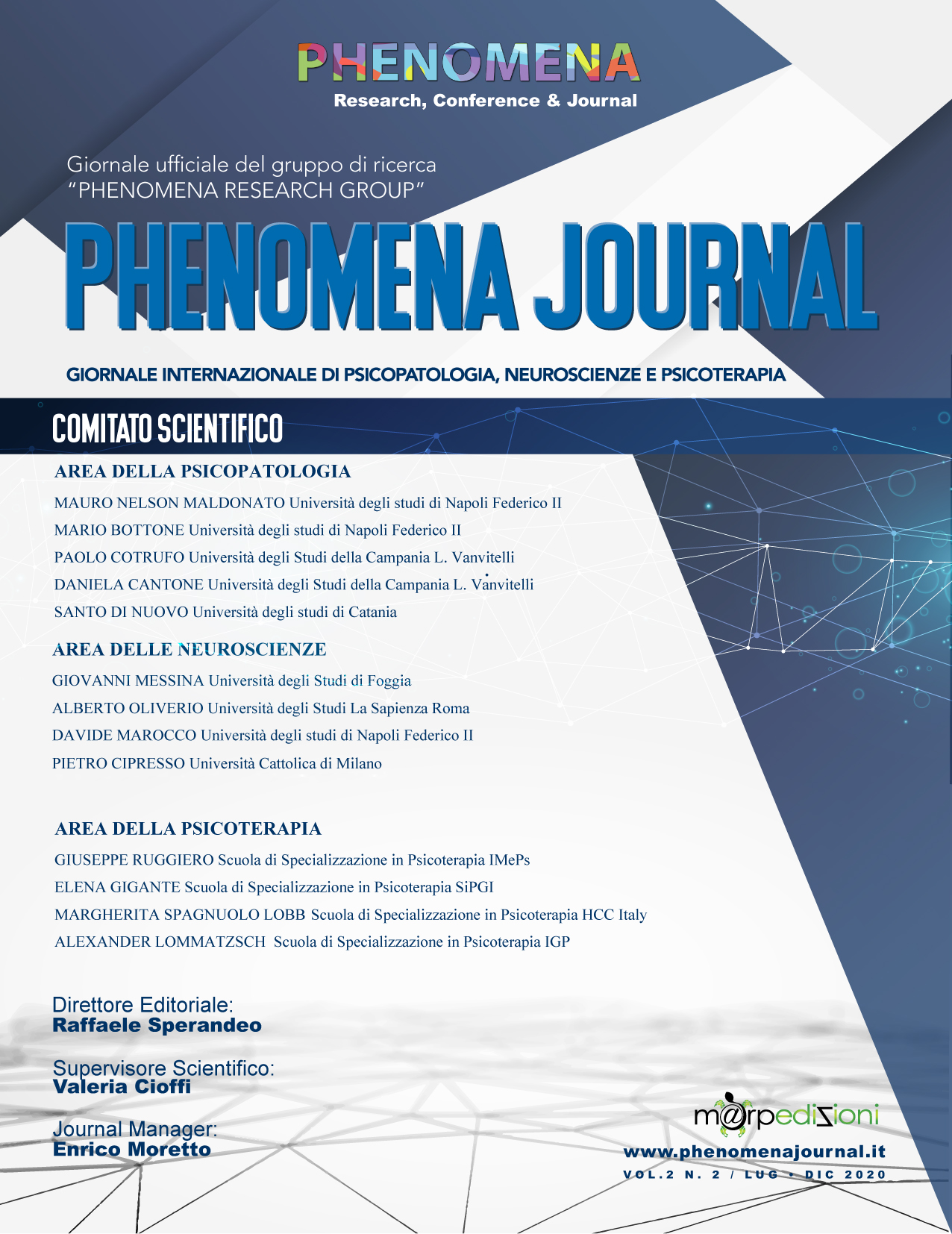Pubblicato 06.10.2020
Parole chiave
- Eating habits,
- COVID-19 emergency
Come citare
Abstract
The COVID-19 pandemic has significantly changed our habits, making us rediscover a different dimension from everyday life and forcing us, in no time, to readjust our lifestyle.
The global outbreak of the new coronavirus disease (COVID-19) has had a huge psychological impact on individuals around the world.
In particular, individuals with eating and weight disorders may experience greater emotional distress resulting in an increase in food psychopathology, exacerbation of mental health and difficulties in self-management.
The aim of this research is to understand how the restrictive and isolation measures issued by governments to contrast and contain the spread of the SARS-CoV-2 virus are changing the eating habits and lifestyles of the population and what psychological consequences they entail.
To this end, an anonymous survey has been planned and launched through the development of an online questionnaire to be administered to Italian adult population.
The future intent is to be able to plan, taking into consideration the results obtained, interventions with an integrated Gestalt approach, which can contribute to achieving good food awareness and thus avoid an increase in all those psychopathologies that are favored or aggravated by behavioral habits incorrect, and to appropriately manage complications and critical issues in people suffering from eating and weight disorders.
Key words: Eating habits; COVID-19 emergency; Eating disorders
Abstract in italiano
La pandemia di COVID-19 ha cambiato notevolmente le nostre abitudini facendoci riscoprire una dimensione diversa del vissuto quotidiano e costringendoci, in pochissimo tempo, a riadattare il nostro stile di vita.
Lo scoppio globale della nuova malattia da coronavirus (COVID-19) ha avuto un enorme impatto psicologico sugli individui di tutto il mondo.
In particolare, gli individui con disturbi alimentari e del peso potrebbero sperimentare un maggiore disagio emotivo con conseguente aumento della psicopatologia alimentare, esacerbazione della salute mentale e difficoltà di autogestione.
L’obiettivo della presente ricerca è comprendere come le misure restrittive e di isolamento emanate dai governi per contrastare e contenere la diffusione del virus SARS-CoV-2, stiano modificando le abitudini alimentari e gli stili di vita della popolazione e quali conseguenze psicologiche implichino. A tal fine si è progettata ed avviata un’indagine anonima nella popolazione adulta italiana attraverso l’elaborazione di un questionario online.
L’intento futuro è quello di poter programmare, tenendo in considerazione i risultati ottenuti, interventi ad approccio gestaltico integrato, che possano contribuire al raggiungimento di una buona consapevolezza alimentare ed evitare così un incremento di tutte quelle psicopatologie che sono favorite o aggravate dalle abitudini comportamentali scorrette, e per gestire in modo appropriato le complicanze e criticità in soggetti affetti da disturbi alimentari e del peso.
Parole chiave: Abitudini Alimentari; Emergenza Covid-19; Disturbi alimentari
Riferimenti bibliografici
- BIBLIOGRAFIA
- Pearl, R. L. (2020). Weight Stigma and the “Quarantine‐15”. Obesity.
- Robinson, B. E. (2020). What is “Quarantine 15”? Why it’s bad for you and six steps to avoid it. Psychology Today.
- Pearl, R. L., Puhl, R. M., & Brownell, K. D. (2012). Positive media portrayals of obese persons: Impact on attitudes and image preferences. Health Psychology, 31(6), 821.
- Dalle Grave, R. (2020). Coronavirus disease 2019 and eating disorders. Eating Disorders: The Facts. Retrieved from https://www. psychologytoday. com/us/blog/eating-disorders-the-facts/202003/coronavirus-disease-2019-and-eating-disorders.
- Carano, A., Totaro, E., Ranalli, C., Cicconetti, A., Mancini, L., Vizza, M., & Mariani, G. (2011). Alessitimia e disturbi del comportamento alimentare.
- Smith M., Segal J., Segal R. “Emotional Eating and How to Stop It”, 2019, https://www.helpguide.org/articles/diet-weight-loss/emotional-eating.htm
- Brooks, S. K., Webster, R. K., Smith, L. E., Woodland, L., Wessely, S., Greenberg, N., & Rubin, G. J. (2020). The psychological impact of quarantine and how to reduce it: rapid review of the evidence. The Lancet.
- Touyz, S., Lacey, H., & Hay, P. (2020). Eating disorders in the time of COVID-19.
- Armstrong-Esther, C. A., Lacey, J. H., Crisp, A. H., & Bryant, T. N. (1978). An investigation of the immune response of patients suffering from anorexia nervosa. Postgraduate medical journal, 54(632), 395-399.
- Butler, M. J., & Barrientos, R. M. (2020). The impact of nutrition on COVID-19 susceptibility and long-term consequences. Brain, Behavior, and Immunity.
- Simonnet, A., Chetboun, M., Poissy, J., Raverdy, V., Noulette, J., Duhamel, A., ... & LICORN and the Lille COVID‐19 and Obesity study group. (2020). High prevalence of obesity in severe acute respiratory syndrome coronavirus‐2 (SARS‐CoV‐2) requiring invasive mechanical ventilation. Obesity.
- Lighter, J., Phillips, M., Hochman, S., Sterling, S., Johnson, D., Francois, F., & Stachel, A. (2020). Obesity in patients younger than 60 years is a risk factor for Covid-19 hospital admission. Clinical Infectious Diseases.
- Branley-Bell, D., & Talbot, C. V. (2020). Exploring the impact of the COVID-19 pandemic and UK lockdown on individuals with experience of eating disorders.
- Phillipou, A., Meyer, D., Neill, E., Tan, E. J., Toh, W. L., Van Rheenen, T. E., & Rossell, S. L. (2020). Eating and exercise behaviors in eating disorders and the general population during the COVID‐19 pandemic in Australia: Initial results from the COLLATE project. International Journal of Eating Disorders.
- Barrington, W. E., Beresford, S. A., McGregor, B. A., & White, E. (2014). Perceived stress and eating behaviors by sex, obesity status, and stress vulnerability: findings from the vitamins and lifestyle (VITAL) study. Journal of the Academy of Nutrition and Dietetics, 114(11), 1791-1799.
- Calugi, S., Milanese, C., Sartirana, M., El Ghoch, M., Sartori, F., Geccherle, E., ... & Dalle Grave, R. (2017). The Eating Disorder Examination Questionnaire: reliability and validity of the Italian version. Eating and Weight Disorders-Studies on Anorexia, Bulimia and Obesity, 22(3), 509-514.
- Stanghellini, G., Castellini, G., Brogna, P., Faravelli, C., & Ricca, V. (2012). Identity and eating disorders (IDEA): a questionnaire evaluating identity and embodiment in eating disorder patients. Psychopathology, 45(3), 147-158.

